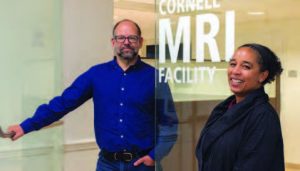Reprinted from cnbc.com, "Why you'll still have a hard time saving money, even if you get a raise" by Darla Mercado.

Adam Anderson and Eve De Rosa
If you were hoping a raise would help you pad your emergency fund, prepare to be disappointed.
That's because your brain has learned to prioritize earning more money over saving it, according to a recent study from a team of neuroscientists at Cornell University.
"There's this implicit blame that people aren't working hard enough and that the lack of savings is a reflection of work ethic," said Adam K. Anderson, associate professor at Cornell University's College of Human Ecology and co-author of the report. "But the data suggest that while people work a lot and work hard, saving is a problem," he said. Indeed, roughly 55 million people have nothing saved for an emergency, according to Bankrate.com. That's no surprise considering that wage growth has been tepid. Further, workers are grappling with an array of competing priorities, including repaying their student loans and saving for retirement.
Here's how your brain is also keeping you from putting money away.
Monetary reward
The neuroscientists studied 78 men with a mean age of 21 and were told to associate one color with "earning," which would have them gain 30 cents, and another color with "saving," avoiding the loss of 30 cents. Participants were given a timing perception task, which would measure how quickly they responded to the colors and chose to either save or earn. In one experiment, nearly 90 percent of the participants earned more than they saved. Three out of four also reported that they saw the color associated with earning on the screen first, when in reality they were seeing the color that corresponded with saving. "You're performing the same job, and you're earning or saving for an equal amount of work," said Anderson of Cornell. "But at the end of that, it seemed easier to perform the task associated with earning," he said. "They responded more quickly and made more money."
Changing your mentality
The scientists surmised that the preference for earning money over saving is a learned behavior. "It's rational from the brain's perspective: You must earn before you can save," said Anderson. "It could partly be cultural," he said. "We brag about work ethic and earnings, but we don't talk about coming up with a cool savings plan." In order to change up your behavior, practice being mindful of squirreling away cash.
1. Acknowledge the problem: It's no secret that a variety of priorities and expenses are competing for your hard-earned dollars, but be aware that merely making more money won't necessarily solve your problems. That's especially the case if you're blowing your raise instead of pocketing it. "For the majority of people, if you make more money, the savings won't match it," said Anderson.
2. Make the choice to save: Having a slice of your paycheck automatically go toward an emergency savings account can help you build your cash reserves without thinking about it. But if you want to change your mentality on saving versus earning, you should also make the active choice to put away a dollar a day, said Eve De Rosa, associate professor at Cornell University's College of Human Ecology, and co-author of the report. "Saving a dollar a day isn't going to accumulate into a fantastic abundance of savings, but this daily practice of attending to saving makes you mindful," said De Rosa.
3. Think ahead: We prioritize the present and attach less importance to the future, which may factor into why people prefer to earn instead of save. "It helps to think about the future us and what we can do for that person," said Anderson. "You can imagine that people default to 'I should earn more,' but the idea is that you want to save for that person in the future," he said.


